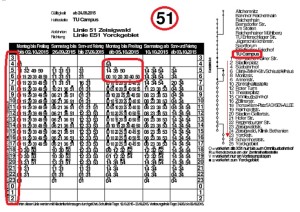As long as you don’t have an own car you have to use public transport, like buses or tramways. There are a few rules you probably should know and remember. Very well then! How do I take the bus in Chemnitz – and actually everywhere else in Germany?
Important Do’s and Don’ts
First of all, you should remember to enter the bus at the front and to show your ticket to the bus driver. In this way, the bus driver insures himself that no one is taking the bus illegally (or as we say in Germany “schwarz fahren”, which can be translated to “taking the bus black”). If you have to run to catch the bus, it is okay to enter the bus at another door than the first one. And if you have bulky things with you, like a buggy or a wheelchair, it is also okay to enter the bus at the middle door. Nevertheless, you should always try to enter the bus at the front and to show your valid ticket. Of course it is also allowed to leave the bus – at every door except the first one. That’s why we have these barriers which only can be pushed into one direction.
If you’re looking for a seat, there are also a few things to remember. Even when we take the bus or tram, Germans can be very distant and reserved. If someone sits down at a window seat, it is okay to take a seat next to them. But sometimes, people sit down at the aisle seat or block the other free seat with a bag. That’s not very polite but sometimes people just want to have a bit free space. Maybe they are sad? Or they have sorrows? Or they are ill and don’t want to infect someone else? You can’t know and therefore, you should respect their need for free space.
Even if the bus is mercilessly jam-packed and there are too many people in one bus, you should try not to touch anyone as far as possible. Germans just don’t like to be touched by unknown people. Let’s call it the “German Distance Rule”. By the way, even in very crowded buses it is forbidden to stand next to the bus driver. It is just allowed to stand behind the barriers. This is due to safety rules – and actually good for the bus driver, so he can see his right rear-view mirror. Please note to keep the yellow strip clear which is drawn on the ground next to the doors. Otherwise, the doors can’t be closed. If you notice that the door doesn’t close, take a step backwards – even if the bus is mercilessly jam-packed.
Every seat should be offered to an old or otherwise needy person, like children, pregnant women or handicapped people. And if you see someone stumbling into the bus with his crutches, you should probably offer him your seat, too. It will be thanked a hundred times.
The area in the middle of the bus is reserved for wheelchairs and buggies. So if you see someone who tries to enter the bus with a wheelchair or buggy, you should take a step sideward. And of course you can offer your help to get the heavy thing into the bus – it will be thanked, too.
Sometimes, tickets are checked in the bus or tram by two or more people. They don’t wear a special clothing but have an ID which allows them to control your ticket. Sometimes, they don’t seem to be very nice but mostly, they are friendly. It is incredibly important to have a valid ticket with you. Otherwise it can be very expensive – for every invalid ticket you have to pay 60 €.
But when does my bus or tram arrive? You can check it at every bus stop. Either it is written on the post with the huge green-yellow “H” or you can find it on the board at the roofed area. In huge letters the bus or tram number is written at the top of the plan. On the left side you can find the full hours and behind them the minutes on which the bus or tram arrives. Here in Chemnitz, we have an easy rule. Buses with a “1” as the second number (21, 31, 51) arrive every 10 minutes. Buses with a “2” as the second number (22, 32, 62, 72) arrive every 20 minutes and buses with a “3” as the second number (23, 43, 63) arrive every 30 minutes. You can also check the departure times on “www.cvag.de” (the website is available in German, English and French). Here you can find the network of Chemnitz buses and tramways.
In the picture you can see the bus number as headline (here: 51). On the left side you can find the full hours and in the middle the minutes of departure. On the right side stands where you are (here: TU Campus) and in which direction you are heading – on the plan always downwards (note the arrow). Please remember that these plans can vary depending on the time of the year (like on holidays, vacation or weekends).

